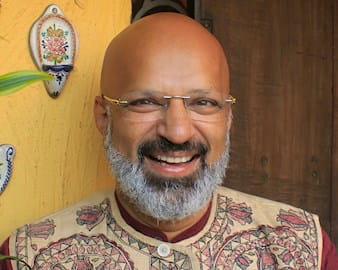How can executives bring out the best in their teams in a time of ongoing crisis? A recent panel of Chicago Booth alumni provided a wealth of practical advice on this topic, describing how organizational leaders can enhance their coaching skills in a way that supports and empowers their employees, even in these times of crisis.
Moderated by Luis Miranda, ’89, chairman for India’s Centre for Civil Society and the Indian School of Public Policy, the event was organized by the UChicago Center in Delhi, in partnership with the UChicago Center in Beijing and Chicago Booth’s Hong Kong campus. All-star panelists included Ruchira Chaudhary, ’13 (AXP-11), author of the new book Coaching: The Secret Code to Uncommon Leadership; and Michael Gibbs, AB ’84, AM ’84, PhD ’89 (Economics), clinical professor of economics at Booth.
“There is no doubt—our world right now is in an unprecedented crisis,” said Zening Ge, PhD ’96 (Economics), the executive director of the Beijing Center, as he kicked off the event. “Organizations big and small have faced challenges, including how leaders can navigate through difficult times while also helping people grow.”
Watch the full video here, or scroll down for top takeaways on how coaching can be a powerful tool for growth and innovation.
The difference between coaching and leadership

“Coaching is not a separate discipline—it’s a subset of good leadership,” Chaudhary explained. “You cannot be a good leader without being a coach.” Organizations are facing a fundamental shift in the digital era, she pointed out. “There are new models, new domains. A leader cannot possibly have all the answers. You need to collaborate, work together, and harness the collective intelligence of the people in your organization.”
Coaching is really asking people what to do—not telling them to do it, she explained. This means that now is the right moment to move away from a top-down approach to management, she counseled, and to create opportunities for creativity and innovation to filter from the bottom up.
Instilling a culture of coaching and feedback within an organization

“Coaching is similar to raising children,” suggested Gibbs. “You’re trying to develop and bring out the best in people, and over time you’re teaching them logic and problem-solving skills, as well as how to think, while also helping them build confidence.”
As a business leader, that means having to actively solicit feedback from workers, letting colleagues know that you value their opinions, and making it clear that you’re using their feedback as a learning opportunity. Much of modern leadership lies in leading by example, role modeling, and instilling positive habits and behaviors that are championed at the highest level, Gibbs said.

By the Book
As an executive coach and consultant, helping leaders develop their teams’ potential is a topic close to Chaudhary’s heart. As she puts it in her new book, “Coaching is the secret sauce that makes leadership effective. It is the code that unlocks uncommon leadership.”
Endorsed by celebrated leaders such as Sheryl Sandberg, Kathleen Hogan, Kiran Mazumdar Shaw and Prof. Sydney Finkelstein, Coaching: The Secret Code to Uncommon Leadership (Penguin, 2021) features Chaudhary’s tried-and-tested framework for sharing a perspective from the intersection of both leadership and coaching, and is filled with research-backed tips and tricks on how to become a more effective leader-coach.
“My message in writing the book is simple: Coaching has never been more important than it is today,” says Chaudhary. “Our already turbulent times demand the ability to navigate these extraordinarily choppy waters with a steady hand at the helm. Trust and resilience will be the rudders, as you (the leader) coach your way to uncommon leadership.”
A graduate of Booth’s Executive MBA – Asia program and leading executive coach, Chaudhary splits her time between Singapore and India. In addition to her own organizational strategy consulting work, she teaches as affiliate faculty at several top tier business schools, has written for leading business journals including Harvard Business Review, and writes a regular column for a mainstream Indian business newspaper, Mint.
How things have changed for today’s teams in the workplace

Between the COVID-19 pandemic, ongoing lockdowns, and continuing economic uncertainty, we now live in a time of unprecedented change, presenting leaders with a host of new and novel challenges, noted Gibbs. “It’s creating economic pressures on companies and individuals. They have to worry about things like safety and distancing, as well as what it means to be a group when none of us are in the same room together.”
With no past precedent or best practices to fall back on, it’s therefore imperative for team leaders and managers to project an air of calm and confidence and to make calculated decisions at all times, while also being mindful of staffers’ morale, Chaudhary reminded attendees. “The term for it is bounded optimism,” she said. “Give people the feeling that we’ll get through this together, because everybody’s looking at leaders for cues. But you also have to take people along on the journey and ensure that you continue to motivate them and bridge fading interpersonal connections.”
The best way to boost employees’ confidence, and the role of empathy
“It’s a difficult situation,” Gibbs admitted. “Most organizations in the private and public sectors face the threat of downsizing and economic turmoil, and employees know that. It’s important to be candid with employees and not sugarcoat the situation. If you’re candid and honest, people will respect you more as a leader.”
But at the same time, it pays to be relentless and practical, as well as a source of positive feedback, Chaudhary countered. “People emulate and look to you for cues. It’s really about assuring people that you’re there for your people and will do the best for them.”
Finding ways to effectively balance both sides of the coin, they agreed, is largely a matter of communication. Reminding employees that you’re empathetic and understanding of their plight is also vital, Chaudhary added. “Show them that you care—and by that, I mean be flexible. Cut them some slack. Between barking dogs and screaming kids, it’s hard work, and we’re all in the same boat. Leaders and managers today need to assure people that they’re there for them and understand their working reality.”
Growing to be a more empathetic leader
You can improve your empathy by finding ways to become a better listener, panelists noted. One simple trick for doing so is to ask intelligent questions that paraphrase what others are saying, helping remind individuals that you are fully focused on them.
Likewise, a mentality of providing service to others can take you far. “Somebody who is empathetic is typically a giver all the way, and has somebody else’s best interest at heart,” Chaudhary stated.
“Empathy is also about being mindful and showing that you care,” Miranda added, encouraging the audience to take an interest in others while being realistic in their approach to problem-solving.”
Parting thoughts on steering organizations through growing uncertainty
Great leaders are as much amazing teachers, coaches, and mentors as they are effective managers, Miranda suggested. But whether you’re a seasoned executive or a new employee, it’s also important to surround yourself with people you can turn to for help and insight if you find yourself stuck or facing an unfamiliar challenge.
“Coaching is a two-way street,” Chaudhary volunteered. Some people believe a coach is like a therapist, she chuckled. But really, coaching is about helping others become better versions of themselves. “A coach won’t provide answers,” she said, but rather “help you discover your own answers” instead.
Booth News & Events to Your Inbox
Stay informed with Booth's newsletter, event notifications, and regular updates featuring faculty research and stories of leadership and impact.
YOUR PRIVACY
We want to demonstrate our commitment to your privacy. Please review Chicago Booth's privacy notice, which provides information explaining how and why we collect particular information when you visit our website.
